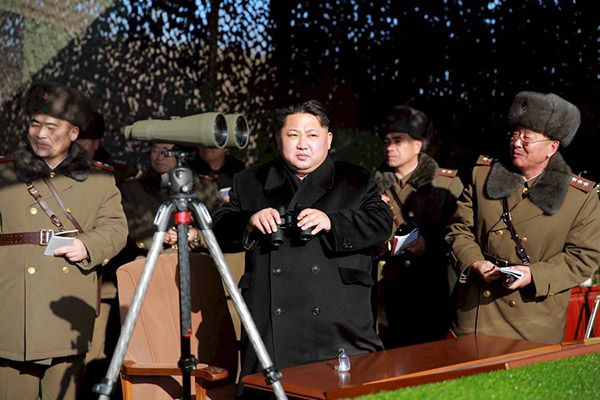China voices its 'resolute opposition' to DPRK test
Updated: 2016-01-06 16:10
By ZHANG YUNBI(chinadaily.com.cn)
|
|||||||||||
The Foreign Ministry issued a rare written statement on Wednesday voicing its "resolute opposition" after the Democratic People's Republic of Korea announced earlier in the day that it had successfully carried out its first hydrogen bomb test.
"Today, the DPRK, disregarding widespread opposition in the international community, once again conducted a nuclear test, and the Chinese government expresses its resolute opposition to this," the statement said.
It is China's firm stance to realize denuclearization on the Korean Peninsula, prevent nuclear proliferation and ensure the peace and stability of Northeast Asia, the ministry noted.
"We strongly urge the DPRK to honor its denuclearization pledges and stop taking any action that will deteriorate the situation," the statement said.
The ministry said championing peace and stability in the peninsula and in Northeast Asia "lives up to the common interests of all parties".
"China will firmly press ahead with the goal of peninsula denuclearization and will uphold resolving the peninsula nuclear issue within the framework of the Six-Party Talks," the statement said.
The Six-Party Talks, which group the DPRK, the ROK, the United States, China, Japan and Russia, were launched in 2003 but stalled in December 2008. The DPRK quit the talks in April 2009.
Expert: Nuclear test made to show increased strength
Yu Meihua, director of the Center for Korean Peninsula Peace Studies under the China Reform Forum, said that from Pyongyang's viewpoint what it described as its H-bomb test on Wednesday was a clear indication of its increased weapon technology.
Yu was speaking after the Democratic People's Republic of Korea announced on Wednesday that it had successfully carried out its first hydrogen bomb test.
The test also served as a major step in the DPRK's plan boost its military power, Yu said.
Pyongyang believes this is a necessary countermeasure to protect it from threats posed by the United States, Yu noted.
"The latest test will boost the top leader's image and the solidarity among the domestic public," Yu suggested.
The test may have consequences for Pyongyang's relationships and cooperation with Seoul, Beijing, Washington and Moscow, Yu said.
Expert: Test may trigger new arms race
Zhang Liangui, an expert in Korean studies at the Party School of the Central Committee of the Communist Party of China, said he believes that the Wednesday test is "not a surprise" as Pyongyang has renewed its official commitment to its nuclear plans in recent years.
The Wednesday test is also a further frustration for the stalled Six-party Talks, Zhang said.
The Six-party Talks, which group the DPRK, the Republic of Korea, the United States, China, Japan and Russia, were launched in 2003 but stalled in December 2008. The DPRK quit the talks in April 2009.
Zhang said that the rest of the parties of the Six-party Talks should take further measures to prompt the DPRK to give up its nuclear plan.
Xinhua contributed to the story
Related Stories
Nuclear deterrence will not bring DPRK security: Opinion 2016-01-06 14:02
DPRK's hydrogen bomb test not a surprise: Expert 2016-01-06 13:11
DPRK says it has successfully carried out 1st hydrogen bomb test 2016-01-06 11:43
M4.9 shallow earthquake detected in DPRK: Chinese seismological agency 2016-01-06 10:13
DPRK test-fires sub-launched ballistic missile in December 2016-01-06 09:20
Today's Top News
Growth and reform
Design exhibition to attract Chinese art works
Germans shaken by mass attacks on women
Concerns grow over Saudi-Iranian rising tensions
Obama tightens gun rules, requires background check
Refugee boy becomes first casualty in 2016
China's high-tech exports beat Japan and South Korea
Storm Frank batters northern Britain
Hot Topics
Lunar probe , China growth forecasts, Emission rules get tougher, China seen through 'colored lens', International board,
Editor's Picks

|

|

|

|

|

|







